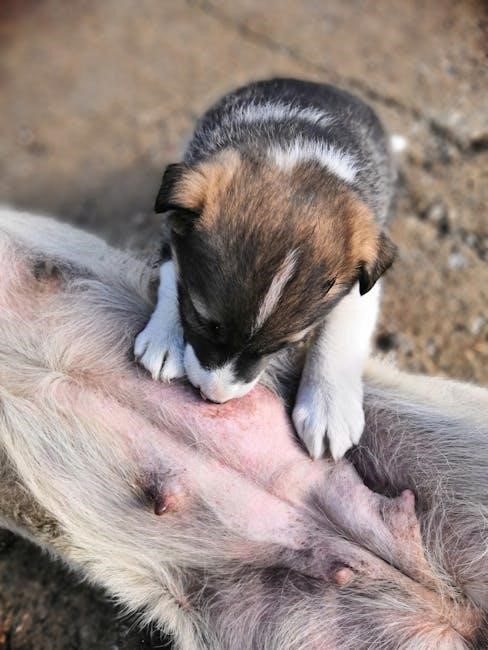Royal Canin Maxi Puppy is tailored for large breeds, supporting growth from 2-15 months. It provides balanced nutrition, immune support, and digestive health for optimal development.
Understanding the Importance of Proper Nutrition for Large Breed Puppies
Proper nutrition is crucial for large breed puppies due to their rapid growth and high energy needs. Ensuring a balanced diet supports muscle development, joint health, and immune function. Royal Canin Maxi Puppy is specifically formulated for puppies weighing 26-44 kg at maturity, addressing their unique nutritional requirements. It provides essential proteins, fats, and carbohydrates to fuel growth while maintaining digestive health. A tailored approach helps prevent issues like joint strain and supports overall development, making it a trusted choice for raising healthy large breed puppies.
Why Royal Canin Maxi Puppy is Tailored for Large Breeds
Royal Canin Maxi Puppy is specifically designed for large breed puppies, addressing their unique growth needs. Formulated for puppies weighing 26-44 kg at maturity, it supports joint health, immune development, and digestive comfort. The tailored approach ensures balanced nutrition, preventing growth-related issues. With a focus on optimal energy levels and muscle development, Royal Canin Maxi Puppy is a trusted choice for large breeds, backed by scientific research to promote healthy growth and well-being during the critical puppy stage.

Key Characteristics of Royal Canin Maxi Puppy Food
Royal Canin Maxi Puppy Food is specially formulated for large breeds aged 2-15 months, offering tailored nutrition, digestive support, and immune system benefits, backed by scientific research.
Ingredients and Nutritional Profile
Royal Canin Maxi Puppy contains high-quality protein sources like chicken by-product meal and fish oil for muscle development. It includes balanced fats and carbohydrates for energy, along with prebiotics for digestive health. The recipe is enriched with antioxidants, vitamins, and minerals to support overall well-being; Formulated specifically for large breeds, it ensures proper growth rates and joint health. The kibble size and texture are designed to suit large puppies’ jaw structures, promoting easy chewing and digestion. This balanced mix of nutrients helps address the unique needs of large-breed puppies during their critical growth phase.
Life Stage and Breed-Specific Formulation
Royal Canin Maxi Puppy is formulated for large-breed puppies aged 2-15 months, weighing 26-44 kg at maturity. This life-stage specific food addresses the unique needs of large breeds, ensuring proper bone and joint development. It supports immune system maturation and digestive health, tailored to their growth phase. The recipe is designed to prevent excessive growth rates, reducing the risk of joint issues. This breed-specific approach ensures optimal nutrition for large puppies, fostering healthy development during their critical growth period.
Support for Growth and Development
Royal Canin Maxi Puppy is formulated to support the rapid growth of large-breed puppies, ensuring proper bone and joint development. It contains antioxidants and essential nutrients to promote a healthy immune system and energy levels. The food is tailored to meet the high energy needs of puppies aged 2-15 months, supporting muscle growth and overall vitality. By providing balanced nutrition, it helps prevent developmental issues, fostering a strong foundation for a healthy adult life. This formula is designed to fuel growth while maintaining joint health and mobility, crucial for large breeds.

Feeding Schedule for Royal Canin Maxi Puppy
Royal Canin Maxi Puppy is designed for puppies aged 2-15 months. Portion sizes are tailored to the puppy’s weight and age, ensuring optimal growth and development.
Determining the Right Portion Sizes
Portion sizes for Royal Canin Maxi Puppy are based on the puppy’s current weight and age. The feeding guide on the packaging provides specific amounts, ensuring proper nutrition. For example, a 2-month-old puppy may need 3-4 cups daily, adjusting as they grow. Overfeeding can lead to obesity, while underfeeding may hinder development. It’s crucial to follow the recommended portions and monitor growth, consulting a vet if needed. Consistency helps maintain a healthy weight and supports overall well-being.
Feeding Frequency: How Often to Feed Your Puppy
Large breed puppies require consistent feeding schedules to support growth. Royal Canin Maxi Puppy recommends feeding 3-4 times daily for puppies under 6 months. As they grow, this can gradually decrease to twice a day; Consistency helps regulate digestion and energy levels. Avoid overfeeding to prevent obesity and joint strain. Ensure each meal is spaced evenly throughout the day. Consult your vet to adjust feeding frequency based on your puppy’s specific needs and growth pace to maintain optimal health and development.
Adjusting Portions as Your Puppy Grows
As your large breed puppy grows, their food portions need adjustment to match their developmental stage. Royal Canin Maxi Puppy recommends starting with smaller, more frequent meals for younger puppies and gradually reducing the frequency as they mature. Portion sizes should align with the puppy’s weight and activity level, ensuring balanced growth. Monitor their physical condition and adjust food amounts to prevent overfeeding. Consult your veterinarian to tailor portion sizes effectively, supporting healthy development without risking obesity or joint issues. Regular weigh-ins can guide precise adjustments for optimal health.

Nutritional Requirements for Large Breed Puppies

Large breed puppies need balanced nutrition for growth, including quality protein, healthy fats, and carbohydrates. Essential vitamins and minerals, along with digestive support, ensure optimal development and overall health.
Protein Sources for Muscle Development
Quality protein sources, such as chicken by-product meal and fish oil, are essential for muscle growth in large breed puppies. These ingredients provide amino acids critical for tissue repair and development. Royal Canin Maxi Puppy is formulated to meet the high protein needs of growing puppies, ensuring strong muscle structure and energy levels. The balanced protein content supports lean muscle development without overloading calories, which is vital for large breeds prone to joint issues. Proper protein intake helps maintain overall health and supports the puppy’s active lifestyle during its growth phase.
Role of Fats and Carbohydrates in Energy Supply
Fats and carbohydrates are essential for providing energy to large breed puppies. Fats supply concentrated energy, while carbohydrates offer quick and sustained power. Together, they ensure the puppy’s high energy demands are met, supporting growth and physical activity.
Vitamins and Minerals for Overall Health
Vitamins and minerals are crucial for a large breed puppy’s overall health. Royal Canin Maxi Puppy includes essential vitamins like A, C, and E to boost immunity and support skin health. Minerals such as calcium and phosphorus promote strong bone development, while others like zinc aid in wound healing and digestion. These nutrients work together to ensure the puppy’s body functions optimally, supporting growth and preventing deficiencies that could hinder development.
Importance of Digestive Health
Digestive health is vital for large breed puppies, as proper nutrient absorption supports growth. Royal Canin Maxi Puppy contains prebiotics and a balanced mix of rice and vegetables to aid digestion. These ingredients help maintain a healthy gut, reducing the risk of digestive issues like diarrhea. A well-supported digestive system ensures your puppy absorbs essential nutrients efficiently, promoting overall health and robust development. A balanced digestive system is key to preventing common gastrointestinal problems in growing puppies.

Health Considerations for Large Breed Puppies
Large breed puppies need tailored care to prevent joint issues and support immune development. Royal Canin Maxi Puppy is formulated to address these specific health needs effectively.
Joint Health and Mobility Support

Royal Canin Maxi Puppy is formulated to support joint health in large breed puppies, minimizing the risk of mobility issues as they grow. With ingredients like glucosamine and chondroitin, it helps strengthen joints and promotes healthy cartilage development. Proper joint care is crucial for large breeds, as they are prone to conditions like hip dysplasia. This tailored nutrition ensures optimal joint function and mobility, enabling puppies to thrive during their critical growth phases.
Immune System Development
Royal Canin Maxi Puppy is enriched with antioxidants and essential nutrients to support the immune system of large breed puppies. A strong immune system is vital during the growth phase, helping puppies resist infections and thrive. The formula includes specific ingredients that promote immune function, ensuring your puppy stays healthy and resilient. This tailored approach addresses the unique needs of large breeds, providing a solid foundation for long-term health and vitality.
Monitoring Growth to Prevent Issues
Regular monitoring of your large breed puppy’s growth is crucial to prevent potential health issues. Royal Canin Maxi Puppy provides a balanced formula that supports steady growth, reducing the risk of joint problems and obesity. By adhering to the feeding guide and consulting your veterinarian, you can ensure your puppy develops at a healthy pace. This careful monitoring helps identify any early signs of imbalance, allowing for timely adjustments to maintain optimal health and prevent long-term complications.

Transitioning to Adult Food
Transitioning from Royal Canin Maxi Puppy to adult food is essential at 12-18 months. This ensures continued support for your large breed dog’s health and development.
When to Switch from Puppy to Adult Food
Large breed puppies typically transition to adult food between 12 to 18 months of age. This period marks when they reach about 90% of their adult weight. Royal Canin Maxi Puppy is formulated for puppies up to 15 months old. Veterinarians recommend monitoring growth and adjusting the transition timing based on individual development. Signs your puppy is ready include physical maturity and breed-specific size milestones. A gradual switch ensures digestive ease and prevents sudden changes in nutrition.

How to Gradually Transition
Transitioning from Royal Canin Maxi Puppy to adult food should be done gradually to prevent digestive upset. Start by mixing 25% adult food with 75% puppy food on day one, then increase the adult portion by 25% every 3-4 days. By day 10, your puppy should be fully transitioned. Monitor their appetite, energy levels, and stool quality during this period. If any adverse reactions occur, slow the transition or consult your veterinarian for advice.
Signs Your Puppy is Ready for Adult Food
Signs your puppy is ready for adult food include reaching physical maturity (around 12-18 months), stable growth rate, and weight. Look for interest in adult formulas and reduced puppy-like behavior. Ensure they’ve reached 70-80% of their adult size. Gradual transition is key to prevent digestive issues. Consult your veterinarian to confirm readiness and adjust feeding plans accordingly.

Common Questions and Concerns
Addressing Overfeeding or Underfeeding
Monitor your puppy’s weight and adjust portions to prevent overfeeding or underfeeding. Consult your vet if you notice weight loss, low energy, or loss of appetite.
Overfeeding can lead to obesity, while underfeeding may cause stunted growth. Monitor your puppy’s weight and adjust Royal Canin Maxi Puppy portions accordingly. Signs of overfeeding include rapid weight gain and lethargy, while underfeeding may result in visible ribs or low energy. Use the feeding guide on the package as a starting point, but tailor it to your puppy’s individual needs. Regular vet check-ups can help ensure your puppy is at a healthy weight. Adjustments should be gradual to prevent digestive upset.
Handling Food Allergies or Sensitivities
If your puppy shows signs of food allergies or sensitivities, such as itching, skin issues, or digestive problems, consult your veterinarian. Common allergens include chicken, beef, or dairy. Royal Canin offers tailored formulas, like hypoallergenic diets, to address these issues. These recipes often use novel protein sources, such as venison or fish, and fewer ingredients to reduce reaction risks. Gradually introduce new foods and monitor your puppy’s response. Always transition under veterinary guidance to ensure your puppy’s health and comfort.
Consulting with Veterinarians
Consulting with veterinarians is crucial for ensuring your puppy receives the best possible nutrition. They can provide personalized feeding recommendations based on your puppy’s health, weight, and growth. Veterinarians often recommend Royal Canin due to its tailored formulas and scientific backing. Regular check-ups help monitor your puppy’s development and address any potential issues early. Always seek professional advice before making significant changes to your puppy’s diet to ensure their nutritional needs are met and to avoid health complications.
Royal Canin Maxi Puppy provides tailored nutrition for large breeds, ensuring healthy growth and development. Follow the feeding guide and consult veterinarians for personalized advice.
Royal Canin Maxi Puppy is formulated for large breeds, ensuring optimal growth and development. Feed according to age and weight, adjusting portions as your puppy grows. Provide 3-4 meals for puppies under 6 months and 2-3 meals thereafter. Transition to adult food around 15 months. Avoid overfeeding and monitor weight. Ensure fresh water is always available. Follow the feeding chart and consult a veterinarian for personalized advice to support your puppy’s health and well-being.
Final Tips for Raising a Healthy Large Breed Puppy
Consistently follow the Royal Canin Maxi Puppy feeding schedule, ensuring portion sizes match your puppy’s growth. Monitor weight and adjust meals to prevent overfeeding. Provide fresh water at all times and maintain a balanced diet. Schedule regular veterinary check-ups to track development. Avoid sudden food changes and slowly transition to adult food at 15 months. Prioritize joint health and immune support through proper nutrition. With dedication and the right feeding practices, your large breed puppy will thrive and grow into a strong, healthy adult.

